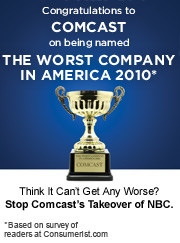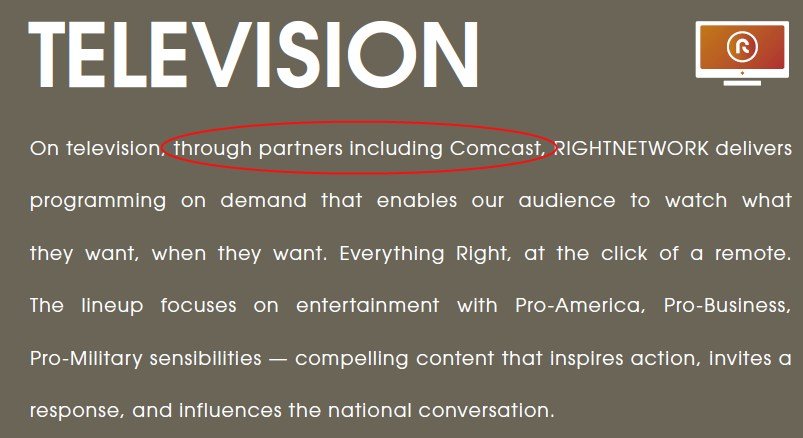
Rightnetwork's logo, which is actually kind of creepy, would be more true to itself if that "R" was replaced with a "C" for Comcast -- its true progenitor.
When your corporate message has to pass through a media filter, your talking points can get lost along the way. Comcast has decided to cut out the middleman by launching a new right-wing, pro-corporate cable network that seeks to co-opt the tea party movement for its own agenda.
Rightnetwork, launching this summer, seeks to reach “Americans who are looking for content that reflects and reinforces their perspective and worldview,” according to its promotional material. Featured prominently in the network’s promotional materials are tea party events and those that promote a pro-corporate agenda. The network’s on-air talent is embedded in the national tea party tour that has been making its way across the country, which gives you a sense of where the network’s early emphasis will lie.
Comcast sheds any pretense of staying above the political fray and jumps in with both feet to deliver its business agenda to viewers.
“The lineup focuses on entertainment with Pro-America, Pro-Business, Pro-Military sensibilities — compelling content that inspires action, invites a response, and influences the national conversation,” says the network’s promotional “lookbook.”
“We’re creating a welcome place for millions and millions of Americans who’ve been looking for an entertainment network and media channel that reflects their point-of-view. Rightnetwork will be the perfect platform to entertain, inform and connect with the American majority about what’s right in the world,” says Ed Snider, chairman of Comcast-Spectacor.
Reviewing promotional clips for the network’s planned shows, something else is readily apparent — wedding a corporate agenda with a political movement in hopes of currying favor with those that might return the favor one day.
<
p style=”text-align: center;”>
One of the network’s most prominent planned shows is “Running,” which is little more than a political infomercial for Republican/tea party candidates. One of the first targets Comcast-Spectacor has in mind is Rep. Henry Waxman (D-California). Waxman is characterized as “infesting” his Congressional seat in the program.
Waxman, coincidentally, is also a big political foe of Comcast, favoring Net Neutrality and deeply concerned about media concentration issues, something the proposed Comcast-NBC merger would exacerbate. Rightnetwork has effectively provided millions of dollars in free publicity to Ari David, Waxman’s opponent. Should David win the seat, he will have Comcast to thank for helping make it possible.
Running‘s featured candidates:
- Ari David, Republican running against Henry Waxman who writes: “Capitalism is under attack from the progressive left.”
- Chris Simcox, Republican who ran against John McCain in the primary, who he called: “a sinister element, a progressive socialist masquerading as the leader and conscience of the Reagan Republican Party.” Wants to promote free enterprise in a “post-McCain era.”
- Clint Didier, a Republican running against Sen. Patty Murray in Washington. He uses his Rightnetwork coverage as a campaign ad on his website.
- Donna Campbell, a Republican running for a Texas congressional seat on the platform of deregulating business.
- Republican Jim Gibbons, a vice president of Wells-Fargo Bank who is running for Congress in Iowa on a platform of deregulating business, even after the already-deregulated banking industry caused the Great Recession.
- Republican John Dennis, running against Nancy Pelosi in California, who showcased an anti-Net Neutrality ruling on his Facebook page with a fan base whose views were best summed up by one writer: “If a private internet service provider wants to restrict certain types of content or opinions moving across their wires, then that should be their prerogative.” That shrugging off of censorship is ironic coming from a supporter of the “pro-Liberty Republican” candidate.
Anyone think there is a “yes” vote for Net Neutrality or oversight of the cable industry and big media mergers among this crowd?
This isn’t Comcast’s first effort to curry favor with conservatives, who seem most likely to support the cable company’s political agenda. Last September, Comcast and AT&T sponsored a U.S. Chamber of Commerce forum keynoted by Fox News personality Glenn Beck. The U.S. Chamber of Commerce, itself implicated in notorious astroturfing efforts, is a strong opponent of Net Neutrality and broadband oversight.
The worst part is saved for last. Who pays for this pro-corporate hackery? You do, as part of your monthly cable bill, whether you want the corporate point of view on your basic cable lineup or not.
That’s just one more reason why the Comcast-NBC merger is such a bad idea. It places enormous resources at the disposal of a company that has no qualms about using them to advance its own political agenda at your expense.
 Comcast spent $3.1 million dollars of its subscribers’ money in the first three months of 2010 lobbying elected officials to approve its proposed merger with NBC-Universal and putting a stop to Net Neutrality proposals, according to disclosure statements files in the House clerk’s office.
Comcast spent $3.1 million dollars of its subscribers’ money in the first three months of 2010 lobbying elected officials to approve its proposed merger with NBC-Universal and putting a stop to Net Neutrality proposals, according to disclosure statements files in the House clerk’s office.

 Subscribe
Subscribe



